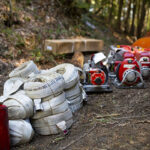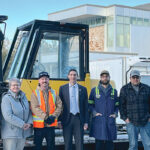Home »

Urban Farm to break ground this fall
Fresh and healthy local food, produced year-round in the community is becoming a reality in Cranbrook.
A group of local organizations have been collaborating on their dream project to start a community Urban Farm in the region. This project is now made possible, thanks to the Local Food Infrastructure Fund (LFIF) grant of $435,106.
The Urban Farm Steering Committee is currently made up of Community Connections Society, Cranbrook Food Recovery, Wildsight Kimberley Cranbrook, Interior Health, Kootenay Employment Services, and College of the Rockies.
The group is excited to announce that the project will break ground in the fall of 2023 as funding for this project, in part, has been provided by Agriculture and Agri-Food Canada.
“We are beyond excited to get started,” said Sophie Larsen of Community Connections. “This project will be a huge benefit for the community for so many reasons – from food security to climate mitigation to community celebration.”
The goal of the farm is to contribute to a healthy, resilient, diverse and secure local food system for the Cranbrook community and surrounding areas.
The project will address many needs, including improving food resiliency, increasing education and training opportunities for growing food and preparing it, and providing a space for community celebrations.
“What’s thrilling about this project is that is contributes to a more resilient and diverse local food system while bringing together voices from across the food landscape to connect, collaborate and support one another,” said Seamus Damstrom, Public Health Dietitian with Interior Health.
The project will have significant environmental impacts including the demonstration of climate adaptation and resiliency techniques, community emissions reductions, the creation of large volumes of locally produced soil amendments and the generation of employment opportunities constructed via a phased approach. Phase One includes the installation of a controlled environment hydroponic growing system, and an industrial, animal-safe composter.
The hydroponic system will be housed within a 10’ x 40’ unit, allowing the farm to grow sustainable and delicious food 365 days a year, regardless of weather conditions. The unit will produce the equivalent of 546 heads of lettuce a week, a portion of which will be sold to sustain farm operations.
The remainder of the crops will go to individuals in need through organizations such as Cranbrook Food Recovery and the Cranbrook Food Bank.
“As food prices continue to rise, we are seeing a huge increase in need for food aid from our community,” said Meredith Funston of Cranbrook Food Recovery. “The ability to grow fresh greens in the dead of winter right here in Cranbrook will help our community become more food secure.”
“As we have witnessed, transportation of food is affected by wildfires, landslides, avalanches, and floods. Droughts in California and other parts of the U.S. also put our food imports at risk,” said Sharon Cross of Wildsight Kimberley Cranbrook.
The project builds on College of the Rockies student capstone projects which indicated that local businesses and organizations want to be part of the climate change solution including organic waste diversion. A number of community supporters have already expressed interest in the Urban Farm such as Cranbrook Chamber of Commerce, Columbia Basin Alliance for Literacy and Morchella Market & Cafe.
According to the B.C. government, organic waste represents 40% of the material sent to B.C. landfills. Cranbrook Food Recovery reports that they have diverted 220,176 pounds of food from the landfill in the past year which equates to 258,226 kg of CO2.
The Urban Farm Steering Committee aims to pilot an organics pick-up program for local restaurants to divert food waste from landfills and in turn reduce greenhouse gas emissions. The compost will then be available as a soil amendment for local growers. This unit will be housed within a shipping container to increase maximum throughput, eliminate any odours and minimize animal attraction.
The Urban Farm Steering Committee is still in the site selection phase and hopes to settle centrally making a place for community collaboration and celebration. Interested landowners who would like to learn more about partnership opportunities should contact the committee via www.cranbrookurbanfarm.com.
“We envision a place to inspire all community members, from school groups to families to newcomers, to improve their skills and grow culturally appropriate food,” Larsen explained.
The Urban Farm will help to enhance the knowledge of locally grown food and the importance of supporting other local producers in the region.
“The Urban Farm will also be a place to teach new skills,” added Kerstin Renner, Regional Community Development Manager at Kootenay Employment Services. “We are excited about the prospect of partnering in the project to facilitate the connection to job seekers through employment readiness activities as well as training and employment opportunities.”
These opportunities will lead to connections with the wider labour market in other food production and growing positions.
For more information please visit the Urban Farm website.
Cranbrook Urban Farm Steering Committee







